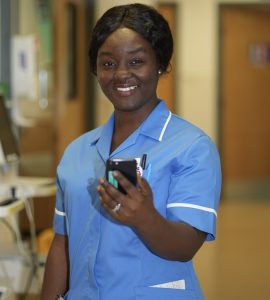Digital healthcare transformation project aims to reduce noise levels in maternity ward
An innovative pilot using smart technology to help make hospital wards a quieter place for both patients and staff has started at Royal Cornwall Hospitals NHS Trust (RCHT).
The Silent Hospital Pilot Project aims to transform our postnatal ward by introducing software that silences patient call bells and drives the audible alerts to mobile phones, carried by midwives and nursing staff.

Patients, staff and visitors should experience the benefits of a quieter and calmer environment and, if the pilot is successful, the new technology could be extended to other wards across the hospital.
The evaluation of the pilot will measure the actual reduction of noise and benefits in terms of improved wellbeing, faster recovery and better communication. Information will be collected from the nurse call system to measure response times and the consistent functioning of the software which will also improve data collection for the hospital’s estate. This will be the first step to potentially introducing other silencing digital technologies for medical equipment, and other noise reduction measures.
Sally Brittain, Director of Midwifery, says: “We are very excited to have been selected to trial the silent nurse call bells on our Wheal Fortune Ward. Our postnatal ward is always a busy place with many parents and newborn babies often unable to get much needed quality rest due to the noisy environment. The babies on the ward that have been born prematurely will also benefit greatly from the quieter and more nurturing environment to support their development.
“We hope this evaluation project will demonstrate that it is possible to make our wards quieter through smart, yet fairly simple, digital solutions. Our midwives and maternity support workers fully embrace the new technology, recognising that it has the potential to transform their working day.”
Roberta Fuller, Programme Director for the Women and Children’s Hospital Programme, adds: “This project has been two years in the planning, partnering with colleagues from the Norwegian healthcare digital solutions company, DNV Imatis, and UK engineering company, TClarke, and is the first digital project to be trialled as part of the development of the new Women and Children’s Hospital Programme.
“The New Hospital Programme transformation team is monitoring our pilot project to see how silent ward solutions can function using regular mobile phones rather than bespoke digital devices. Our ambition is to explore more digital technologies for the new Women and Children’s hospital, such as equipment and patient tracking, wayfinding software and communications systems to improve the delivery of cleaning, catering and portering. Environmental sustainability measures such as energy monitoring and room-by-room control of heating, lighting and ventilation are also being considered to improve the patient experience in our new hospital.”
Cesilie Kullerud, Chief Marketing and Communications Officer at DNV Imatis says: “We are delighted to contribute to the digital transformation of RCHT and the Silent Hospital Project on the Wheal Fortune Ward. As the supplier of the digital platform and software suite, and with 20 years of experience of collaborating with hospitals, we recognise the challenges faced by postnatal wards in maintaining a peaceful environment for patients and newborns.
“Through this evaluation project, we aim to demonstrate how our solutions can effectively reduce noise levels and enhance the overall experience for both patients and staff. We look forward to supporting RCHT in this endeavour and are excited about the impact of our technology on their operations.”

